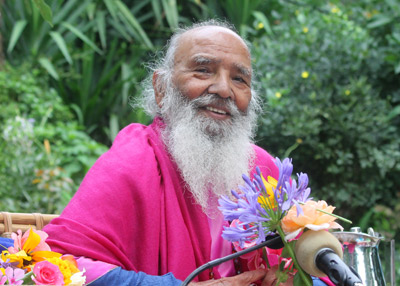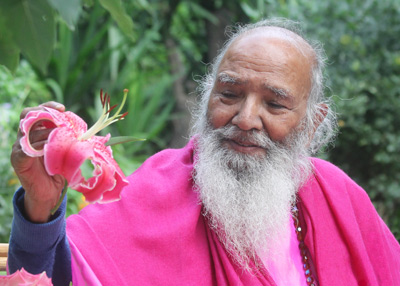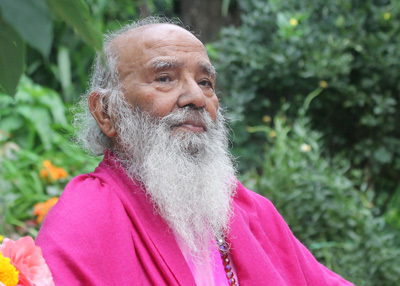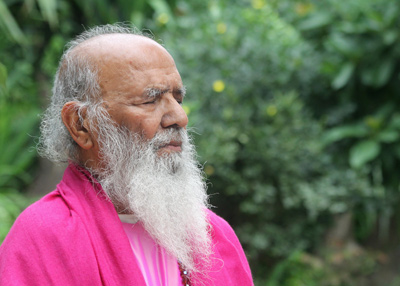The First Imagination Is “I Am”

The sense of duality—only a human being can know it. He knows “I am one person and you are another. We are both travelling in one car but we are two.” The car is not shy of two of you. The Space is not shy of two of you, because that is Oneness. But Oneness takes itself to be a human being—it is nobody else but the very Oneness that takes itself to be a human being. And then it takes itself to be another human being, maybe millions of individual people. Then each individual immediately develops the sense “I am.”
The Space, which was only the Self, Oneness, becomes “I am,” second. The very Space becomes the sense of somebody else, duality. That sense becomes a solid form, nature, a seed, then two seeds.
I was saying yesterday about the fig tree. It has its fruit, figs. The fruit is one, but there are innumerable seeds. How is that? And each thinks, “I am the seed and I can produce the whole tree.”
You did not develop this sense of duality from anywhere else—it is from the same Oneness. You became a human being and you know, “I am my name.” But each person’s world of experience will be something else other than yours.
Each person develops his sense of duality, which is ego, intellect and mind in the case of a human being. The individual says, “I am,” so we call it jeev, soul or individual self. And that individual says “I am” only in relation with the body, which is made of the five tattwas, or gross elements— earth, water, fire, air, and sky.
In the body, the essence is the Self. But this Self essence, if it is separate, is the “I am” in between the Self and the body. Before “I am” it is only that I which cannot be known as I. It becomes “I am” when that little seed in the fig is there. “I am” is seed now because I became a body.
In association with the body, I became body and then senses. I developed the senses. The moment “I am body” came, then I began to have eyes, which represent the sky; ears, which represent the sky; nose, which represents the sky; mouth, which represents the sky. As a human being, you come to know the sky alone, and then air, fire, water, and earth. These four are known separately, but they are all sky. Without sky, air cannot be. But in sky who is sitting? The thought “I am.” That “I am” became sky. Sky was never there, it was “I am.” “I am” was nothing but a wave of the Oneness. And Oneness is pure.
Pure is the sky and the sense of duality. Here, the sense of duality is created: “I am sky.” I is I always. It is not “…am sky.” The moment you say, “I am my name,” immediately we come to know you have a name. When the child gets his name he becomes dualistic. He will say, This is my name,” and that name is associated with his form. The whole creation is from Oneness. But the moment creation takes place there is nobody to create it. Man knows the very Self, the very Oneness, which is shuddh, or pure. If he can know it, he should also be able to know “I am That.” But no, he just conceives he is That, but he has forgotten. He has forgotten and made “I am this body.”
The whole creation is from Oneness. But the moment creation takes place there is nobody to create it. Man knows the very Self, the very Oneness, which is shuddh, or pure. If he can know it, he should also be able to know “I am That.” But no, he just conceives he is That, but he has forgotten. He has forgotten and made “I am this body.”
Now in this body “I am” will create eyes and ears. Ears represent sound. Eyes represent sight. Touch, or skin, represents air. Fire represents heat or the sun. And water represents ras, the sap or essence.
Ras makes all the trees. If you know the sap, you know the whole forest. But in the forest, each tree will not know the sap. So each human being will not know the sap that is running through everyone’s veins. Each person will not know the fire, sitting in everyone, that digests the food. Each person will not know the fragrance, the essence of smell. And he will not know the knower, the thinker is in everyone. When he thinks he thinks that which he has experienced—those things and forms.
We call these subtle elements tanmatras. Tanmatras mean the subtlest reality. But still subtler than the subtlest reality is You, the Space. We give the name “Space.” It is not space even, because space is in relation to time—time and space, and then causation. There are three things: time, space, and causation. Man makes everything concrete—time turns into clock and calendar. But time is what? Abstract. And one has no ability to know time because time is Oneness. Everybody is born in time, of time.
It became so difficult for a human being to understand the original Self, the original Being. When I say you are the original Being, you say, “No, I am my name.” We will not disturb you unless you become ready to understand your name was never there. If it was never there, why are you sticking to it? But a human cannot leave it—name is there.
If name is there, it is associated by the child with the form. The form became a reality. You became a seed and now this seed will produce a tree. It will start producing, associating with friends, relations, all kinds of children, grandchildren, the world beings, the planet and everything. And it is only that which is the sense of duality.
The sense of duality is that the very Space has chosen to become “I am.” It was not “I am.” The moment it became “I am,” individuality came, the sense of duality came. The sense of duality assumed itself to be someone. It forgot the Essence, the Pure, the Oneness. When we say Pure we lead your attention towards Oneness because you have sense of duality. You can easily know that the sense of duality is not Oneness. Then you develop awareness. You become open—open to the fact that sense of duality is not your true nature.
Sense of duality is imagination. The first imagination is “I am.” “I am” is not your ribs or blood, “I am” is your intellect. Ego-intellect-mind is the first body, which is unseen, invisible—you cannot pinpoint it. That is the antahavahak, the first body out of Oneness. Out of Oneness, it is Oneness. As long as you remember “I am Oneness,” then you are not “I am body.” But the moment you remember “I am born as a body,” then the sense of duality started: birth came, then living came, kaam, krodh, lobh, moh, ahankaar, or lust and desire, anger, possession, meum, and pride—all these things came. Iccha, desire, came; raag-dwaysh, attraction and aversion, came. It’s all intellectual space, mind space, ego space.
To the eyes, you look like a human body, but you are nothing but intellect. Everybody is nothing but intellect, and intellect is nothing but the sense of duality. In Hindi we call the sense of duality vaasana, you call it desire.
After hearing this you came to know “I am born. I say it, but I do not know I am born.” Why? Who knows? The one who is Oneness, he knows that you were not born, it is Me always. If you become aware, I’ll say “You are Me,” but you say, “No, no, I’m my name.”
 Pure Free Forever is your true nature in which name is not, in which body is not, in which form is not, in which relations are not, in which kaam, krodh, lobh, moh, ahankaar are not. But a human being is intellect, which is only the imagination “I am.” He was never “I am.” But from where did this “I am” come? All human beings remain quiet. They say, “I am. I feel that I am.”
Pure Free Forever is your true nature in which name is not, in which body is not, in which form is not, in which relations are not, in which kaam, krodh, lobh, moh, ahankaar are not. But a human being is intellect, which is only the imagination “I am.” He was never “I am.” But from where did this “I am” come? All human beings remain quiet. They say, “I am. I feel that I am.”
The sense of duality says the sense of duality is right. I say you are freedom, but you say, “I feel that I am freedom, but ‘I am.’” This “I am” is rigidly fixed with everyone—that “I am born.” The moment “I am” comes then I will be in time and space. And time and space has given you your age in time. When your time is over then your “I am” is not there, your body is not there. What is there? You have no chance to see. Then again you incarnate. They say you incarnate again and again.
The sense of duality is that the very Space has chosen to become “I am.” It was not “I am.” The moment it became “I am,” individuality came, the sense of duality came. The sense of duality assumed itself to be someone. It forgot the Essence, the Pure, the Oneness. When we say Pure we lead your attention towards Oneness because you have sense of duality. You can easily know that the sense of duality is not Oneness. Then you develop awareness. You become open—open to the fact that sense of duality is not your true nature.
Sense of duality is imagination. The first imagination is “I am.” “I am” is not your ribs or blood, “I am” is your intellect. Ego-intellect-mind is the first body, which is unseen, invisible—you cannot pinpoint it. That is the antahavahak, the first body out of Oneness. Out of Oneness, it is Oneness. As long as you remember “I am Oneness,” then you are not “I am body.” But the moment you remember “I am born as a body,” then the sense of duality started: birth came, then living came, kaam, krodh, lobh, moh, ahankaar, or lust and desire, anger, possession, meum, and pride—all these things came. Iccha, desire, came; raag-dwaysh, attraction and aversion, came. It’s all intellectual space, mind space, ego space.
To the eyes, you look like a human body, but you are nothing but intellect. Everybody is nothing but intellect, and intellect is nothing but the sense of duality. In Hindi we call the sense of duality vaasana, you call it desire.
After hearing this you came to know “I am born. I say it, but I do not know I am born.” Why? Who knows? The one who is Oneness, he knows that you were not born, it is Me always. If you become aware, I’ll say “You are Me,” but you say, “No, no, I’m my name.”
Pure Free Forever is your true nature in which name is not, in which body is not, in which form is not, in which relations are not, in which kaam, krodh, lobh, moh, ahankaar are not. But a human being is intellect, which is only the imagination “I am.” He was never “I am.” But from where did this “I am” come? All human beings remain quiet. They say, “I am. I feel that I am.”
The sense of duality says the sense of duality is right. I say you are freedom, but you say, “I feel that I am freedom, but ‘I am.’” This “I am” is rigidly fixed with everyone—that “I am born.” The moment “I am” comes then I will be in time and space. And time and space has given you your age in time. When your time is over then your “I am” is not there, your body is not there. What is there? You have no chance to see. Then again you incarnate. They say you incarnate again and again.
 We have reached here and it is a kind of truth. Truth is Oneness. And everybody knows that. Why? Truth never changes. Everybody has heard it. But they do not know what is that which never changes. Again, we make the point that you know that Truth never changes. Then what changes? You say, “Earth changes, water changes, fire changes, air changes, sky changes, and my thinking changes—this I know. Swami-ji, you tell me what is unchanging.” I say unchanging is that which is you, the real Being, everybody’s I, everybody’s you.
We have reached here and it is a kind of truth. Truth is Oneness. And everybody knows that. Why? Truth never changes. Everybody has heard it. But they do not know what is that which never changes. Again, we make the point that you know that Truth never changes. Then what changes? You say, “Earth changes, water changes, fire changes, air changes, sky changes, and my thinking changes—this I know. Swami-ji, you tell me what is unchanging.” I say unchanging is that which is you, the real Being, everybody’s I, everybody’s you.
We know I and you because this is the first wave, the sense of duality. Oneness is saying, “I am someone else other than Oneness.” And I am now saying, no, no, you are this visible reality for name’s sake, for intellect’s sake, for ego’s sake, for senses’ sake, for body’s sake, but you are You, Anubhav. We brought the word anubhav, or experience—anubhav is translated as experience. You say “the experience of flowers.” Flowers are there and your body is there, but where is experience?
You come to know but you are not going to understand and realize that “experience I am.” You will always say, “I am this and flowers are this.” It becomes the world formation. The world becomes real because you become real. And it changes and then you become disillusioned. Your relations are gone, your friends are gone, everything is gone. All your senses were working perfectly when you were young and now they do not work. You are disillusioned, but you are body and you have been fixed that you are your name.
I say you will be disillusioned one day, so why not be disillusioned now? Why should you remain under illusion? This “I am” is illusory awareness. When you come to know then you can manage whether you choose Oneness as your nature, having this body, or remain this body projecting towards this and that. If you like to be freedom, you have to know “I am free.” You have to identify with freedom. But you say, “I know I am freedom, but I have to speak from my mouth and this body. Therefore, body is essential. Body is first and I am later on.”
That has become the difficulty of a human being. But on your birthday it becomes very easy to know that you were not at one time. I say you were that which is forever. It is forever even now. You became a body—not of anything else but Oneness. Oneness is still there. If you know Oneness, everybody is in Oneness and you are so vast. The whole world is you. Then you will know that leaves and flowers are different in forms, but the sap is one. When you become sap, the experience, the anubhav, then the whole is you. And it is Oneness.
Copyright © 1999-2013 International
Meditation Institute. All Rights Reserved